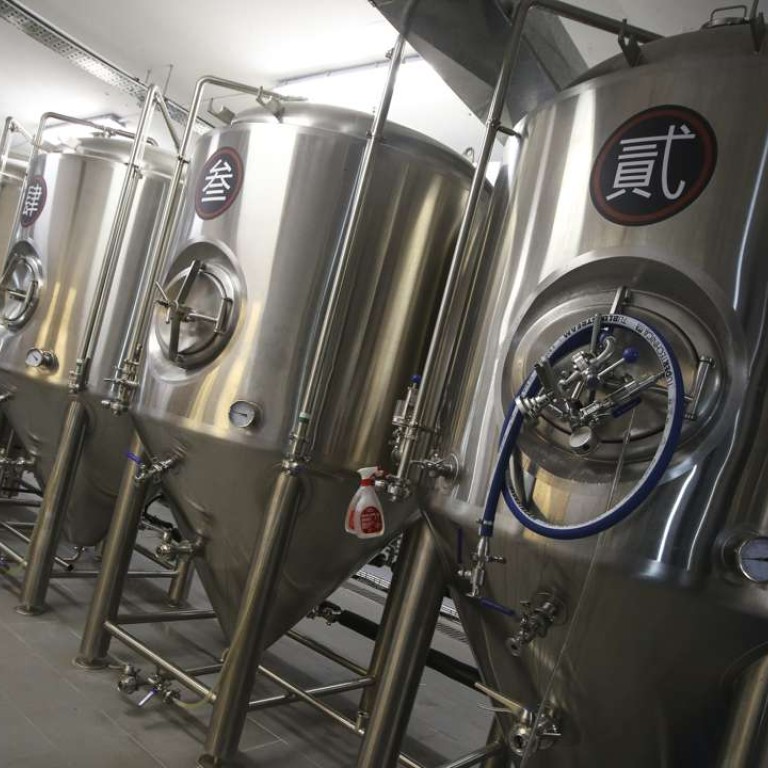
The husband and wife behind Hong Kong craft beer Moonzen, and how it got its name
Laszlo Raphael started out brewing beer as a hobby; two years on, he and his wife make 1,000 litres at a time. They’re proud to be infusing their beers with the localist spirit and reviving the ‘Made in Hong Kong’ tradition
A couple of years ago, Laszlo Raphael was brewing beer at his Hong Kong home in a five-gallon pot. Now he makes it commercially in his own 6,000 sq ft brewery, Moonzen.
“You know when you’re good at something, and all your friends say, ‘You should do this for a living. You should start a business’, and in one of those crazy moments, you take that advice …” he says, by way of explanation.
Raphael and his wife, Michele Wong Raphael, officially started Moonzen in December 2013, renting a tiny industrial space in Kwun Tong, Kowloon, and producing batches of just 100 litres. This year they moved into different Kwun Tong premises, where they are able to produce 10 times as much.
Neither had any experience in the industry: Raphael was an oil engineer, who left his job in Tunisia, North Africa, because of unrest in the area, and Wong Raphael worked at a university in Hong Kong.

“I’ll be honest,” she says, “two years ago, I never would have thought this [brewery] would happen. Maybe Laszlo had a better idea, he can be sneaky like that. He says, ‘Let’s go for a walk’, and it ends up being a mountain. I would have been very scared if we hadn’t started from that small space. I’m still terrified.”
However, the pair look like they’ve been doing this all their lives. Wong Raphael walks us effortlessly through the brewing process: “Craft beer is very simple. It’s malted barley, hops, yeast and water.”

While brewing is a technical process, creating the brand was more emotive. The name Moonzen is an approximate transliteration of the Cantonese phrase mun san, or door guardians, the gods whose images are often displayed at the entrances of Chinese buildings. It was inspired by the couple’s time in Beijing, where they met, and their trips to surrounding villages.
“Every temple, every village house had a pair of door guardians,” Wong Raphael says. “They were all very different, very colourful, especially the ones in the temples – they were beautiful. We fell in love with the imagery; [they] protect the household, bring good luck, ward off evil. They’re full of integrity and strength. They encapsulate all the values we want Moonzen to be about. Once you open the temple doors, you enter a world of different gods.”
Each of the five beers in Moonzen’s permanent range is named after a figure in the Chinese pantheon, with Thunder God pale ale, Jade Emperor IPA and Moon Goddess chocolate stout.

“They say every beer has a story. [Here] every story has a beer,” says Wong Raphael. “We had a good honey porter recipe, and we thought it would be good [to name it] for the Kitchen God. He looks after the kitchen and reports to the Jade Emperor. Every Chinese New Year, you put honey in his mouth to make sure he only says sweet things or seal his lips. Adding honey to beer makes it much more aromatic or dry.
They say every beer has a story. [Here] every story has a beer
“The Monkey King, he’s a cheeky character, very mischievous, but he has a heart of gold, which is like an amber ale with caramel, sweet, toffee-like notes and a hint of peaches, because he steals peaches from the Queen Mother’s garden.”
Moonzen also produces special-edition beers in collaboration with other producers and local artists, as well as bespoke brews for restaurants such as The Pawn and Beef & Liberty, both of which are in Wan Chai. The brewery has also started producing beers that each represent a province, such as the porter Yama, which incorporates Sichuan’s famous peppers. That is soon to be followed by a Fujian-inspired beer that showcases golden pomelo.
“There’s a resurgence of localism all around the world,” Raphael says. “We see beer as an expression of that originality and authenticity, and [a return] to the ‘made in Hong Kong’ reputation.” ■

